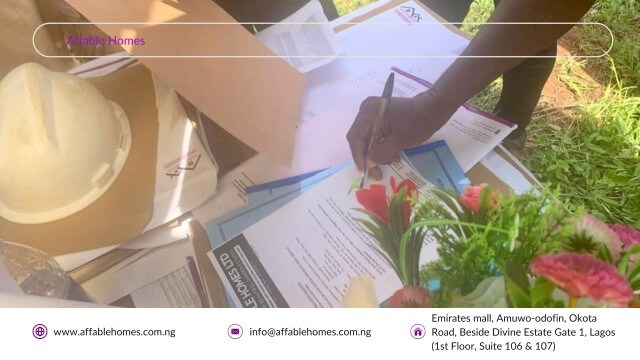Selling or buying a property in Nigeria comes with its fair share of paperwork. Among the essential documents you need to own a property in Nigeria, a deed of assignment plays a critical role in legally transferring ownership from one person to another.
If you’re new to property transactions or just want to ensure your investment is protected, this guide breaks it all down—no legal jargon, just the facts you need to know.
What is a Deed of Assignment?
A deed of assignment is a legal document that officially transfers ownership of property from the seller (assignor) to the buyer (assignee). Simply put, it’s the document that proves you’re now the rightful owner.
It goes beyond a simple receipt or agreement; it legally records that the seller has given up all rights to the property and transferred them to the buyer. This makes it a crucial document in any property transaction.
What Should a Deed of Assignment Include?
For the deed to hold legal weight, certain key details need to be included. Here’s what to look out for:
- Names of the parties involved: Clearly state the assignor (seller) and assignee (buyer).
- Property description: Include specific details about the property, like its location, size, and boundaries.
- Terms of transfer: Highlight the conditions under which the property is being sold, including the price.
- Date of the transaction: The date when ownership officially changes hands.
- Signatures: Both parties, along with witnesses, need to sign the document for it to be valid.
Why is the Deed of Assignment so Important?
Imagine buying a piece of land, only to find out later that someone else also claims ownership.
This happens more often than you’d think. A deed of assignment helps you avoid this nightmare. Here’s how:
- It protects your rights: The deed is legal proof that the property now belongs to you.
- It prevents disputes: With a deed of assignment, you have documented evidence that the seller no longer owns the property.
- It simplifies future processes: You’ll need this document to register the property with the land registry, which further cements your ownership.
Without it, your claim to the property could easily be challenged, leaving you vulnerable.
Also Read:
- 10 Simple Questions to Ask Before Buying Land in Badagry
- Follow This To Verify Your Land Ownership in Ofada Owode
- The 5 Best Places to Buy Land in Anambra as a Nigerian in the Diaspora
How to Get a Deed of Assignment in Nigeria
Getting a deed of assignment isn’t as complicated as it sounds, but it does require a few key steps.
1. Start with a property search
Before you even think about drafting a deed, make sure the property is free of legal issues. Visit the land registry in the state where the property is located to confirm that the seller is the rightful owner and that there are no disputes or encumbrances.
2. Hire a lawyer
Don’t try to draft the deed yourself. Property transactions involve legal technicalities, so it’s essential to hire a qualified property lawyer to prepare the document. They’ll ensure all the legal requirements are met and that your interests are protected.
3. Review the draft
Once the lawyer prepares the deed, go through it carefully. Verify every detail, especially the property description, terms of transfer, and names of the parties involved.
4. Execute the deed
Both parties and their witnesses must sign the document. To add extra legal weight, it’s a good idea to have it stamped by a commissioner of oaths.
How to Register a Deed of Assignment in Nigeria
After signing the deed, you’re not quite done yet. Registration is the final—and arguably most important—step. Here’s how to do it:
- Obtain the Governor’s Consent: By law, all property transfers in Nigeria require the Governor’s Consent. Apply for this at the state land registry.
- Pay stamp duties: You’ll need to pay stamp duties to the Federal Inland Revenue Service (FIRS).
- Submit the deed for registration: Take the stamped deed, along with evidence of payment, to the land registry.
- Receive your registered deed: Once approved, you’ll get a copy of the registered deed.
This step officially records your ownership and protects you from any future disputes.
Avoid these Common Mistakes
When it comes to deeds of assignment, a few common missteps can lead to serious problems. Here’s what to watch out for:
Skipping legal advice: Trying to save money by skipping a lawyer can cost you much more in the long run.
Not registering the deed: Without registration, the document holds little weight in court if disputes arise.
Inaccurate property details: Errors in the property description can lead to complications, so double-check everything.
Deed of Assignment Vs Other Property Documents?
It’s easy to confuse a deed of assignment with other property documents. Here’s how it differs:
- Certificate of Occupancy (C of O): While a C of O confirms the land is legally allocated by the government, the deed of assignment shows the transfer of ownership between private parties.
- Land Purchase Agreement: This document outlines the terms of sale but doesn’t transfer ownership. The deed of assignment does.
Both documents are important, but they serve different purposes.
Deed of Assignment and Securing Generational Wealth
A deed of assignment isn’t just a document for the present—it plays a critical role in protecting future generations.
Here’s why:
- Estate planning and inheritance: A registered deed of assignment ensures a smooth transfer of property to heirs. Without it, disputes may arise, leaving your loved ones vulnerable to legal battles.
- Proof of ownership for financing: Should you or your heirs need to secure a loan or mortgage using the property as collateral, lenders will require proof of ownership. A registered deed of assignment provides the legal backing needed.
- Avoiding family disputes: Property ownership disputes are a common cause of family conflicts. Ensuring your deed of assignment is properly executed and registered, creates a clear, indisputable record of ownership.
- Long-term value retention: Properties with complete and verifiable documentation, including a deed of assignment, retain their value better over time. This ensures that your property’s Return on Investment continues to benefit future generations.
You see, securing your deed of assignment, you’re not just protecting your property today—you’re setting up a legacy that your family can rely on tomorrow.
Final thoughts
Buying property is a significant investment, and the last thing you want is to leave it vulnerable to disputes or fraud.
A deed of assignment in Nigeria isn’t just a piece of paper; it’s your legal shield. It ensures your ownership is clear, valid, and protected.
If you’re planning a property transaction, don’t cut corners. Hire a lawyer, follow the proper steps, and most importantly, register your deed of assignment. It’s a small price to pay for peace of mind.
Also Read:
- What to Look for During a Land Site Inspection in Ofada Owode
- Read This Before You Buy Land in Ogbaku, Imo State
- 5 Emerging Locations for Real Estate Investment in Southeast Nigeria
FAQs About Deed of Assignment
Can I use a deed of assignment without registering it?
Yes, but it’s risky. Registration provides public notice of your ownership and gives the deed legal backing in court.
What happens if there’s a dispute over the property?
A registered deed of assignment can be presented as evidence, making it easier to defend your claim in court.
To explore any of our real estate investment packages like land banking, retirement plan, kids education investment plan, trade apprenticeship plan or if you want to purchase some plots where you will have residential or commercial buildings, send an email to us at info@affablehomes.com.ng or call +2349134056630.





Join The Discussion